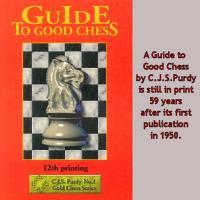
Osmosis—Chess Mastery Made Easy
There are almost as many ways of learning to play chess as there are players. Some people study assiduously; some learn just enough to get by; others take pride in never having studied the game at all; still more just enjoy pushing around those intriguing little pieces, rather like a hit-and-giggle tennis match. We all do it differently.
A few years ago I was dancing with a friend and the music changed. I said, “I don't know this dance.”
“Do you want to sit down?” she asked.
“No. It's OK. I'll pick it up by osmosis.”
“What's osmosis?”
“He's the guy who led the Israelites out of Egypt in the Old Testament.”
“Oh!” she said, “I haven't read the Bible.”
I guess I've used the same osmotic approach to chess as to dancing. Like every other enthusiast I started by learning as much as I could in a short time, then spent the rest of my life coasting along, picking up a little here and there. Like a small child at the dinner table I ate all the tasty bits and relished the dessert, but avoided those unpalatable, time-consuming exercises that would have helped me to grow up to be “big and strong, like Daddy”.
I'm not alone.
Of course, there are different ways of learning by osmosis and some are more effective than others.
IM C. J. S. Purdy, five times Australian Champion and the first Correspondence Chess World Champion was a fierce tournament player and a highly respected teacher.
Although he wouldn't have thought of his method as osmosis (and wouldn't thank me for suggesting that it is) he recommended something that sounds very similar. In his Guide to Good Chess, a beginners' primer, he wrote:
Practise, as the term is generally understood—meaning playing games against living opponents—is of some help, but not very important, and not even necessary, up to a point.
But real practice—playing over published games, and covering one side's moves with a card to give you a chance to think of a move yourself before looking—is absolutely indispensable for anyone who wants to become good quickly. It's only commonsense that if you continue playing rabbits you remain a rabbit, whereas if you are constantly comparing your moves with the moves played by experts in the same positions, you must gradually draw nearer to the expert's level”
He went on to say:
In 1946, the British championship was won by an almost unknown Scot, R. F. Combe, who had hardly played a game of chess in six years. But his hobby was playing over published games by a cosy fire somewhere in the Highlands, and this had made him good enough to win the title at his only attempted, though the field included some famous players. The method is infallible...
So there you have it. A great chess teacher's magic lozenge for improving your game.
I've been playing on chess.com for less than eighteen months and in that time I've seen some of my friends and regular opponents improve their rating, and their play, enormously. One guy, against whom I had a plus score less than a year ago, has improved his play—and his positional understanding—to a level which would command respect in any company. If he reads this he might be willing to share his wisdom with us.
It can be done, and Purdy's method feels like one of the best.
What do you think?
[Footnote: Fifty-nine years after its first publication in 1950 Purdy's "Guide to Good Chess" is still in print.
Purdy himself died at the board while playing in a tournament. Despite extensive analysis it has proved impossible to determine who would have won the game.]
